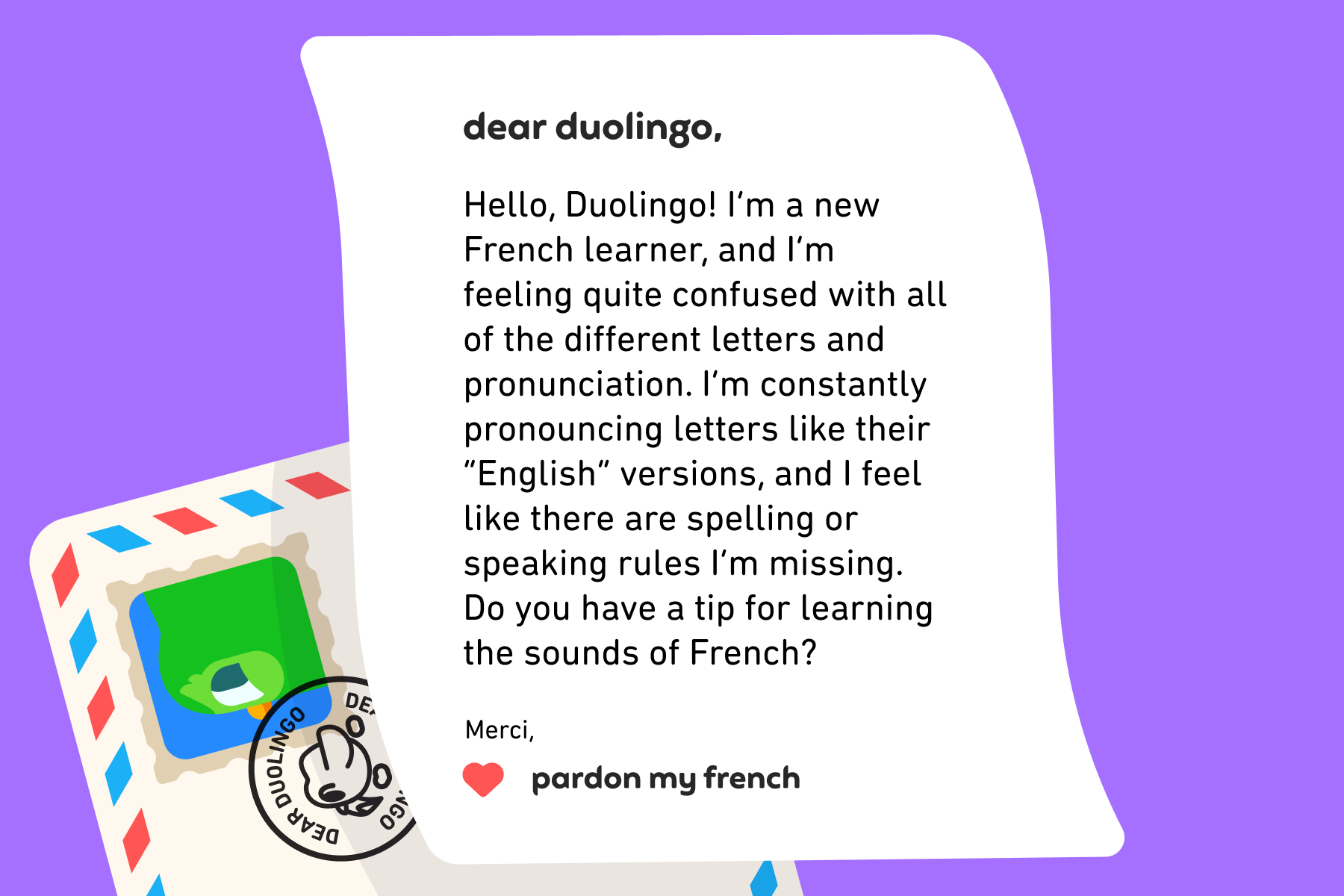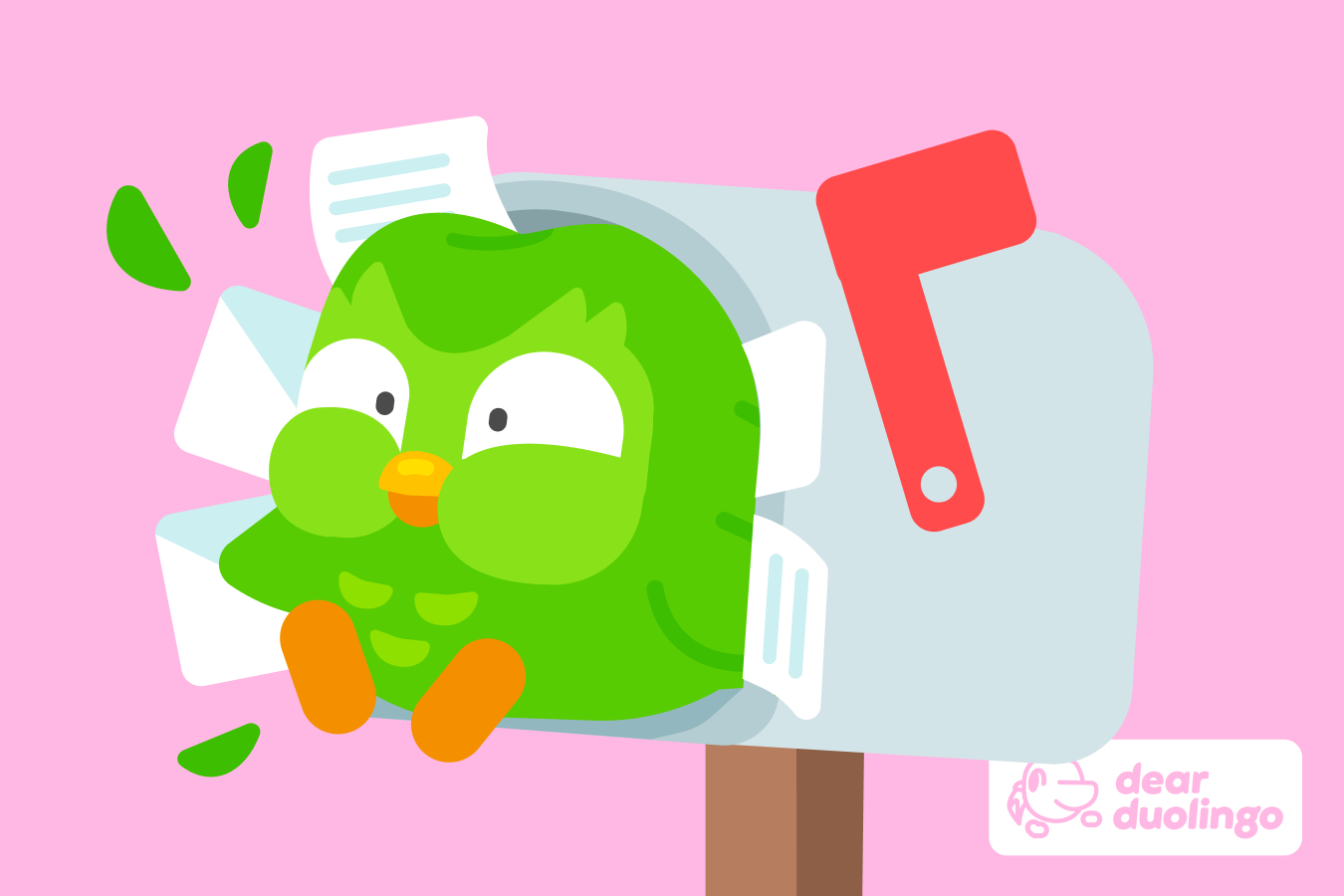Welcome to another week of Dear Duolingo, an advice column just for learners. Catch up on past installments here.
Bonjour à tous ! This week, you’re getting a two-for-one all about French pronunciation: Dr. Emilie Zuniga (French speaker, linguist, and hyperpolyglot) is teaming up with Dr. Sharon Wilkinson (Senior Learning Designer and former college instructor of French pronunciation) to do the impossible… explain how to pronounce French!
Our question this week:

Oh Pardon My French, you are not alone in wondering how French pronunciation works! But the good news is, unlike English, where a letter combination like “ough” can have a bunch of different pronunciations (as in thought, through, thorough, trough), French pronunciation is actually predictable from spelling.
These spelling rules have their roots in the way French evolved over time, and once you understand how they work, you’ll start to spot patterns and pronounce words with more confidence!
Note that the pronunciations you’ll hear in this post are from standard French, but there are many varieties of French, even within France!
In this post:
How to pronounce French consonants
How to pronounce French vowels
Silent letters in French (and how to know which ones to pronounce)
What sounds do French consonants make?
Many consonant letters make the same sounds in English and in French, so you already have a head start! Here are a few notable differences.
| Letters | Sound (IPA) | Examples |
|---|---|---|
| ch | /ʃ/ | chat (cat) blanche (white) |
| ç | /s/ | ça (that) français (French) |
| h | (it’s silent!) | hôtel (hotel) habiter (to live) |
| j | /ʒ/ | je (I) jeudi (Thursday) |
| ‑il ‑ill‑ |
/j/ | travail (work) fille (girl) |
| qu | /k/ | quel (which) quartier (neighborhood) |
| th | /t/ | thé (tea) mathématiques (mathematics) |
Pronunciation notes:
- “h” is always silent in French, so make sure you don’t pronounce it in words like hôtel!
- “j” sounds like the “s” in English pleasure.
- There is no “l” sound in the pronunciation of ‑il and ‑ill, so travail(work) rhymes with “bye” (a commonly used English borrowing!).
- For more advanced learners: French “t” and “th” aren’t aspirated in standard French, just like the “t” in English stop(and unlike the “t” in Englishtime). This is also true of French “p” and “c/k.”
Hey, what about the French “r”?
Lots of learners fixate on the difficulty of the French “r” sound, but you already come very close to making a French “r” when you say an English “h”! If you can say “hose” in English, then you can say “rose” like a Parisian by just tightening your throat a little more on the “h.” But, truth be told, any “r” will do—an English “r,” a rolled Spanish “r”—all pronunciations are understandable. So, don’t let a charming accent on your “r” sound keep you from speaking with confidence!
What sounds do French vowels make?
There are some commonalities between French and English vowels, but a lot of differences, too. Let’s focus on vowel sounds first, and then we’ll look at some special vowel-consonant combos.
Vowel spellings and pronunciation
| Letters | Sound (IPA) | Examples |
|---|---|---|
| ai | /ɛ/ | j’aime (I love) chaise (chair) |
| o | /o/ | pot (jar) moto (motorcycle) chose (thing) rose (pink) |
| o | /ɔ/ | porte (door) robe (dress) |
| au eau ô |
/o/ | chaud (hot) beau (beautiful) nôtre (ours) |
| eu œu |
/ø/ | peut (is able to) vœux (wishes) creuse (hollow) heureuse (happy) |
| eu œu |
/œ/ | peur (fear) sœur (sister) meuf (slang for “woman”) bœuf (ox, beef) |
| oi | /wa/ | moi (me) voiture (car) |
| i y |
/i/ | merci (thank you) il y a (there is/are) |
| i + vowel | /j/ | étudiant (student) bière (beer) |
| ou | /u/ | nous (we) bonjour (hello) |
| ou + vowel | /w/ | oui (yes) chouette (owl) |
| u | /y/ | tu (you) salut (hi) |
| u + vowel | /ɥ/ | suis (am) cuisine (kitchen) |
Pronunciation notes:
- To make the French “u” sound, as in su(known), say “ee” like in Englishseewhile rounding your lips in a kissy face 💋
- Pronouncing “u” immediately followed by “i” (as in huit“eight”) may be tricky at first, so make sure you practice a lot! Focus on making the “u” sound and then slowly transition to “i.” Do this over and over again until you can do it fast!
- /ɔ/, as in porte(door), makes the same sound as “aw” in American Englishsaw.
- /œ/ as in cœur(heart) orhumeur(mood) sounds like “i” in Englishsir—easy! And to say /ø/ as invœux(wishes) oreux(them), make the /œ/ sound while rounding your lips in a kissy face 💋💋
- Since “eu,” “œu,” and “o” have multiple pronunciations, how do you know which one to use? The answer is in the type of syllable those vowels appear in!
| Letters | Type of syllable | ||
|---|---|---|---|
| If the vowel is the last sound in the syllable… | If the syllable ends with the sound [z]… | If the syllable ends with a consonant sound other than [z]… | |
| eu œu |
…say /ø/! Examples: peut vœux |
…also say /ø/! Examples: creuse heureuse |
…say /œ/! Examples: peur sœur |
| o | …say /o/! Examples: pot moto |
…also say /o/! Examples: chose rose |
…say /ɔ/! Examples: porte robe |
Vowel + “m” or “n”
French has 4 “nasal” vowel sounds (where some of the air comes out through your nose as you speak). Distinguishing among these nasal vowels can make a difference in meaning—for example, sont (are) sounds similar to sent (feels), but they are not identical (just like but and bot are similar but not the same in English).
| Letters | Sound (IPA) | Examples |
|---|---|---|
| aim ain ein im in |
/ɛ̃/ | faim (hunger) jardin (garden) |
| am an em en |
/ɑ̃/ | mange (eat) enchantée (nice to meet you) |
| om on |
/ɔ̃/ | maison (house) ombre (shade) |
| um un |
/œ̃/ | un (one) parfum (perfume) |
Nasal vowels can join forces with another vowel before them, but don’t let that throw you off! You’ve already learned the pieces of these combinations.
| Letters | Sound (IPA) | Examples |
|---|---|---|
| ien | /jɛ̃/ | bientôt (soon) italien (Italian) |
| oin | /wɛ̃/ | loin (far) moins (less) |
| tion | /sjɔ̃/ | addition (addition) station (station) |
Pronunciation notes:
- The “t” in “tion” is pronounced like an “s” as in génération(generation).
- Not every vowel followed by “m” or “n” becomes nasal. For example, the vowel *before* “m” or “n” isn’t nasal when there’s another vowel *after* “m”/“n”, as in bonne(good) orcanapé(couch). When there is no following vowel—like inbonbon(candy) andcamper(to camp)—then the vowel before “m” or “n” is nasal.
Combinations with “e” at the end of a word
A special note about all the ways that words in French can end with an “e”: An “e” as the very last letter of a word is silent in standard French, but accent marks and other letter combinations change that silent sound into an extra syllable. Great news, though: all the combinations below are pronounced the same way!
| Letters | Sound (IPA) | Examples |
|---|---|---|
| ‑é | /e/ | fermé (closed) université (university) |
| ‑ée | /e/ | musée (museum) lycée (high school) |
| ‑er | /e/ | parler (to speak) habiter (to live) |
| ‑ez | /e/ | parlez (speak) habitez (live) |
| ‑es (in one-syllable words) | /e/ | les (the) mes (my) |
What letters should or shouldn’t be pronounced?
We’ve already mentioned a few cases where letters shouldn’t be pronounced in French. Let’s take a look at more letters and letter combinations:
If a verb ends with ‑ent:
- ⛔️ Don’t pronounce it!
- That means that for many present tense verbs, the je, tu, il/elle, and ils/elles forms are all pronounced the same: je mange(I eat),tu manges(you eat),il mange(he eats),elle mange(she eats),ils mangent(they eat),elles mangent(they eat).
- Note that this is only for verbs with ‑ent—other words that end in ‑ent follow the rule for words ending with ‑t, so you pronounce ‑en‑ but not ‑t, for example souvent(often) orcouvent(covent).
If a word ends with consonants c, r, f, l (the consonants in CaReFuL):
- 👍 Pronounce it!
- For example, avec(with),bonjour(hello),neuf(new),hôtel(hotel) are all pronounced with that last consonant.
If a word ends with any other consonant:
- ⛔️ Don’t pronounce it!
- However, you do often pronounce a final consonant if the next word starts with a vowel; this is called liaison (linking), since that extra consonant sound acts like a link between the end of a word and the beginning of the next.
- For example, in vous parlez(you speak), the ‑s isn’t pronounced at all, but before a word that starts with a vowel, it is sometimes pronounced, like invous avez(you have) where the ‑s sounds like a ‑z.
If a word ends with an ‑e:
- ⛔️ Don’t pronounce it!
- Except when the ‑e is the only vowel sound in the word, as in je(I) andque(whom, that).
If a word has an apostrophe in it:
- For pronunciation purposes, ignore the apostrophe! Pronounce the word as if it were just a regular word without an apostrophe.
- Common examples include l’eau(the water) andd’ici(from here).
Take it step by step!
Now that you have the main rules of French spelling and pronunciation (as well as more general pronunciation tips), remember to start small and focus on communication! Practice with the words you see and hear most often, and build from there. To strengthen your skills, make time to listen to lots of French—your ears will thank you. Allez, courage ! 🎉
For more answers to your language and learning questions, get in touch with us by emailing dearduolingo@duolingo.com.
